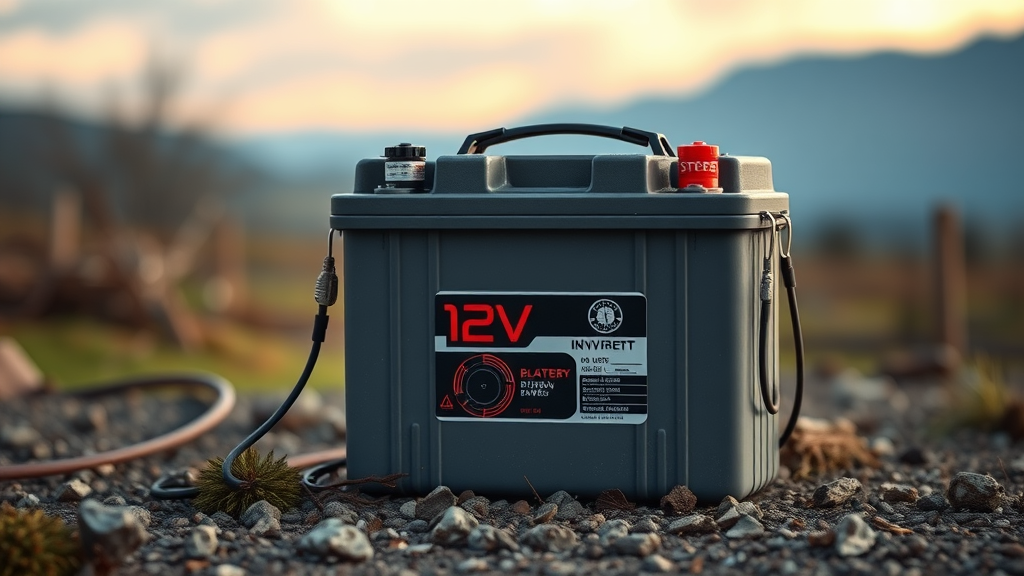Physical Address
304 North Cardinal St.
Dorchester Center, MA 02124
Physical Address
304 North Cardinal St.
Dorchester Center, MA 02124
A 12V battery’s runtime with an inverter depends on its capacity and the connected load’s wattage.

When powering devices using a 12V battery and inverter, understanding the potential duration requires careful analysis of multiple critical factors. The total runtime depends on several interconnected variables that directly impact battery performance and energy consumption.
Calculating battery duration starts with understanding the total wattage of connected devices. Each electronic device draws a specific amount of power, which determines how quickly your battery will drain. For instance:
• Laptop: 60-90 watts
• Smartphone charger: 5-10 watts
• LED lights: 10-20 watts
• Small refrigerator: 100-200 watts
The fundamental formula involves dividing battery capacity by total power consumption. A 100Ah 12V battery provides approximately 1200 watt-hours of energy, which means runtime varies dramatically based on connected load.
Battery type significantly influences overall performance. Deep cycle batteries typically offer more consistent power delivery compared to standard automotive batteries. Recommended options include:
Inverter efficiency plays a crucial role in determining actual battery runtime. Most standard inverters operate at 85-95% efficiency, meaning some energy is lost during conversion from DC to AC power. Higher quality inverters minimize energy waste and extend potential battery duration.
Temperature dramatically affects battery performance. Batteries operate most efficiently between 68-77°F (20-25°C). Extreme temperatures can reduce battery capacity by:
• Cold temperatures: Up to 50% capacity reduction
• High temperatures: Accelerated chemical degradation
| Device | Watts | Estimated Runtime |
|---|---|---|
| Laptop | 75 watts | 12-16 hours |
| Small Refrigerator | 150 watts | 6-8 hours |
| LED Lights | 20 watts | 48-60 hours |
Proper battery maintenance extends overall lifespan and ensures consistent performance. Regular charging, avoiding complete discharge, and storing in moderate temperatures help maximize battery potential.
Recommended Resources:
Battery University
Renogy Solar Solutions
Victron Energy
Additional Optimization Strategies:
Understanding these comprehensive factors helps users maximize battery performance and predict realistic runtime expectations when utilizing 12V battery systems with inverters.
When you’re planning to use a 12V battery with an inverter, understanding power consumption and battery runtime is crucial for effectively managing your electrical needs. The duration a battery will last depends on several critical factors that directly impact its performance and longevity.
Your battery’s runtime is fundamentally determined by two primary components: the battery’s capacity and the total power draw from connected devices. For instance, a 100Ah (Ampere-hour) battery won’t provide the same runtime across different appliance loads.
To calculate potential runtime, you’ll need to perform a straightforward mathematical equation. First, determine the total watts your devices will consume. For example, if you’re running:
Your total load would be approximately 80 watts. Using a standard 12V battery with 100Ah capacity, you can estimate runtime by dividing the battery’s watt-hours by total power consumption.
| Battery Capacity | Total Load | Estimated Runtime |
|---|---|---|
| 100Ah | 80 watts | Around 12-14 hours |
| 50Ah | 80 watts | Approximately 6-8 hours |
Inverters aren’t 100% efficient, typically operating between 85-95% efficiency. This means you’ll lose some power during the conversion from DC to AC. A high-quality pure sine wave inverter will provide better performance compared to modified sine wave alternatives.
Recommended best practices include:
Different battery technologies significantly influence runtime:
Temperature also plays a critical role. Extreme cold or heat can reduce battery performance and available runtime by 10-30%.
For more detailed technical information, consider consulting professional resources:
Battery Stuff
Solar Information Portal
Professional-grade inverters with advanced power management can help optimize your battery’s performance. Some modern inverters provide real-time monitoring of power consumption, helping you make informed decisions about energy usage.
Remember that actual runtime can vary based on specific conditions. Always maintain a buffer and avoid pushing your battery to its absolute limits to ensure longevity and reliable performance.
By understanding these fundamental principles, you can effectively manage your 12V battery’s runtime and make informed decisions about power consumption with your inverter setup.
Understanding how long a 12V battery will last with an inverter requires careful consideration of multiple variables. The runtime depends critically on your specific power demands, battery capacity, and the efficiency of your inverter system. Homeowners and outdoor enthusiasts should always approach battery usage strategically, performing precise calculations to estimate expected duration.
Your battery’s performance isn’t just about its rated capacity, but how effectively you manage its discharge rate. By monitoring power consumption, selecting appropriate battery types, and implementing energy-efficient practices, you can maximize your battery’s potential. Lithium batteries, for instance, typically offer longer and more consistent performance compared to traditional lead-acid options.
Key takeaways for optimizing your 12V battery and inverter setup include:
• Accurately measuring total wattage of connected devices
• Choosing batteries with sufficient amp-hour ratings
• Avoiding complete battery depletion
• Maintaining proper battery health through regular maintenance
• Investing in high-quality, efficient inverters
Practical planning is essential. Before relying on your battery-inverter system during critical moments like camping, emergency backup, or off-grid scenarios, conduct thorough runtime tests. This proactive approach ensures you understand exactly how long your power source will support your electrical needs.
Remember that battery longevity isn’t just about immediate performance, but also long-term sustainability. Regular monitoring, proper charging techniques, and understanding your specific power requirements will help you extract maximum value and reliability from your 12V battery and inverter system.